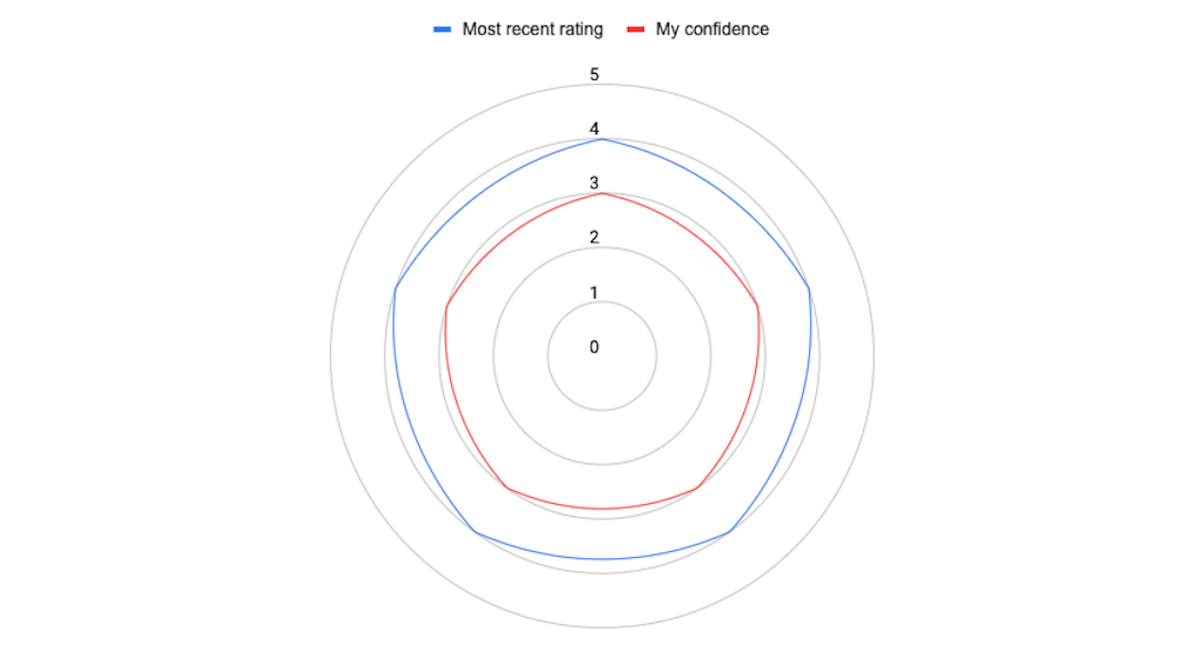Don’t miss out on mentorship opportunities: Broadening our definition of mentorship
Mentorship can play a key part in any career, no matter what stage. Whether you’re an individual contributor, manager, or director, you can leverage your own skills – and those around you – to influence growth across your team, org, and company.
Broadening the definition of mentorship
We often view mentorship through a very specific lens: one person sitting down with another, more junior person, to impart some valuable experience or knowledge.
This version of mentorship may seem distant or unrealistic to some. Many people don’t have access to a suitable mentor, don’t know where to look for one, or simply haven’t thought about how a mentor might help them to develop and grow within their career. They also may not have considered their own potential to offer mentorship to others.
Crafting a culture of mentorship across your company
Mentorship is defined simply as the guidance provided by a mentor, especially an experienced person in a company or educational institution. The formal one-to-one, structured session we picture when we hear the word “mentorship” is just one of many ways to take advantage of mentorship as a resource in your company.
“When you begin to look at mentorship through a wider lens, it becomes clear that opportunities to receive or offer mentorship crop up all the time”
Every team has a valuable mix of strengths, and varying levels of skill and expertise in different areas across its members. Every team member has something to teach the rest of the team, and something to learn from their teammates – whether that’s a skill, a new perspective, or career advice. When you begin to look at mentorship through a wider lens, it becomes clear that opportunities to receive or offer mentorship crop up all the time – you just have to be able to spot them.
You don’t necessarily need a formal mentor program, or a defined mentor-mentee relationship to ensure mentorship has a place in your career, team, and company. It’s easy to look at mentorship as a one-to-one activity, but it’s important for companies to build a culture of mentorship at every level. There are three overarching areas to consider:
Leveraging mentorship across your team
This means creating mentorship opportunities and space for mentorship on a team or org level. It’s about building a team environment where people are aware of their strengths and areas for improvement, and are comfortable to ask others for guidance or offer valuable advice when they can.
Implementing a culture of feedback and action is an important part of this, but it takes self-awareness across the entire team to build the ideal environment for mentorship. To break down barriers to mentorship on your team, ask yourself:
What’s the shape of my team?
Take time to understand your own strengths and gaps in your knowledge, as well as those of your team. Making your team aware of the expertise they can offer, and who can benefit from it, will help to create a well-rounded group of people who can help each other, and other teams, develop.
I use a spider diagram to measure my performance, and my confidence, in each of the five skills product managers are measured against at Intercom.

Spider diagram mapping out my strengths and growth areas based on feedback and my confidence in each area
The blue line shows my performance assessment from my last review, while the red line reflects the level of confidence I have in each skill. In addition, I’ll record specific areas of growth I’ve identified, either from my own perspective or feedback I’ve received.
This information is invaluable to me as I mentor others on my team, and to anyone who’s mentoring me because it can give them a clear picture of where I’m coming from and where I want to go.
Honestly and objectively identifying your skill areas and growth opportunities – and encouraging others on your team to do the same – unlocks the benefits of mentorship. Once you’ve honestly and objectively identified your skill areas and growth opportunities, you can begin to answer the important questions:
- Are there specific people that are strong in the areas where I’d like to grow, and would they be willing to help me improve?
- What help and advice can I offer to others on my team?
- What do I need/want to work on and why?
- Is mentorship the right solution to help me in the areas I’m underperforming or want to improve?
Do my teammates feel safe to be vulnerable?
Trust, safety, and honesty are essential when building a culture of mentorship – there’s an enormous amount of vulnerability required for people to let their guards down, admit their weaknesses, and acknowledge their strengths.
Often, people will seek mentors outside their team or company for this very reason – external mentors can be extremely helpful, and the right choice for many – but it’s important to build a team environment which doesn’t force people to seek mentorship elsewhere.
“We sometimes turn to a mentor because we’ve identified a problem or some way we can grow, but we’re not currently receiving the feedback we need to improve”
When was the last time I heard someone give valuable feedback to someone else on my team?
It’s important to be able to recognize when a situation might just call for constructive feedback, and not mentorship at all.
A lack of regular, timely feedback means that the effort required to course-correct is much higher, and ends up creating the need for focused help from a mentor. We sometimes turn to a mentor because we’ve identified a problem or some way we can grow, but we’re not currently receiving the feedback we need to improve.
Leveraging mentorship for someone else: Being a mentor
At this stage, you’ve identified your strengths and might discover that you feel confident sharing your knowledge, expertise, or advice with someone who has room for growth in a specific area. However, mentorship is a two-way relationship, so before you jump in to offer your help, consider the following questions:
Do I understand the situation and have consent?
Before offering mentorship to another person, you should always think about whether the person in question definitely wants your help and is open to being mentored. Don’t push your advice onto another person if they haven’t expressed any interest.
This is where biases can come into play, whether conscious or unconscious. For example, a man in a senior position might assume that a more junior woman would benefit from his advice, when in fact she may not feel she needs his help, and could experience the situation very negatively. Consider what’s right for the particular person, situation, and context before offering to mentor another person.
“Mentorship isn’t just about sitting down with someone one-to-one and helping someone to improve a skill. It can also mean helping to create opportunities for people when you have the chance”
Am I making the most of small opportunities?
Mentorship is a spectrum, and you need to be prepared to take any opportunity to facilitate mentorship on your team, no matter how small.
Can I empower people to pursue their goals?
Mentorship isn’t just about sitting down with someone one-to-one and helping someone to improve a skill. It can also mean helping to create opportunities for people when you have the chance.
This is where an awareness of your own privilege is essential. For example, managers may have power to decide how work is distributed. Another way to think of that is that we have the power to give opportunities or take them away. We should use that privilege wisely, to create space for people who might find it difficult to do for themselves.
Think of a senior team member choosing who they will ask to work with them on a specific project. Is there someone who could benefit from this specific experience? Is there a team member who may have been passed over for other opportunities that may appreciate the chance to get involved?
Am I helping to create mentorship opportunities elsewhere?
Being aware of the growth areas and strengths across your team allows you to easily spot opportunities to help your teammates grow or develop.
Ask yourself:
- Can I create opportunities for someone to speak or contribute more that might help them develop in an area they’ve identified?
- Can I help steer work or involve people in opportunities to work on a skill that’s important to them?
- Can I connect people to mentors?
For example, if a teammate is looking to develop their presentation skills, you could invite them to contribute to a presentation you’re delivering, and support them to prepare and execute their part successfully.
Leveraging mentorship for yourself: Preparing for mentorship
We’ve spoken a lot about awareness about the strengths and areas for growth on your team. Before seeking out a mentor, or accepting an offer of mentorship, it’s important to be intimately familiar with your own strengths and the areas you want to improve – whether you’re looking to reach the next level of your role, or develop a skill that you feel will allow you to perform your current job better.
Ask yourself:
Do I have SMART goals?
Most of us are familiar with SMART goals: objectives that are specific, measurable, achievable, relevant, and time-bound.
Setting SMART goals eliminates vagueness from your goals, breaks them down into manageable steps, and forces you to think about how you’ll actually achieve them. These are invaluable resources for any mentor looking for opportunities to help you develop.
Do I know how my goals fit in with my work, and where do I need support?
Align your goals with real projects and tasks – based on your current projects, which goals are you on track to achieve? Are there projects that you’re not currently working on that would offer an opportunity for you to work on an area of improvement you’ve identified? Who might be able to help you get involved?
“It takes ongoing commitment to create and maintain a mentorship culture within your team, org, and company”
Are my goals up-to-date?
It’s important to check on yourself every now and then to make sure your goals are still relevant. Your goals and circumstances will evolve and change, and it’s important that you stay up-to-date so as not to miss out on key opportunities for mentorship.
Develop your teams by seizing opportunities
It takes ongoing commitment to create and maintain a mentorship culture within your team, org, and company – but the results will be worth it. Employees are your company’s greatest asset, so building an environment where everyone is aware of their strengths and weaknesses, and feels comfortable giving and receiving help, will pay incredible dividends as you scale.
Looking for a new challenge? We’re hiring – take a look at our open roles.







